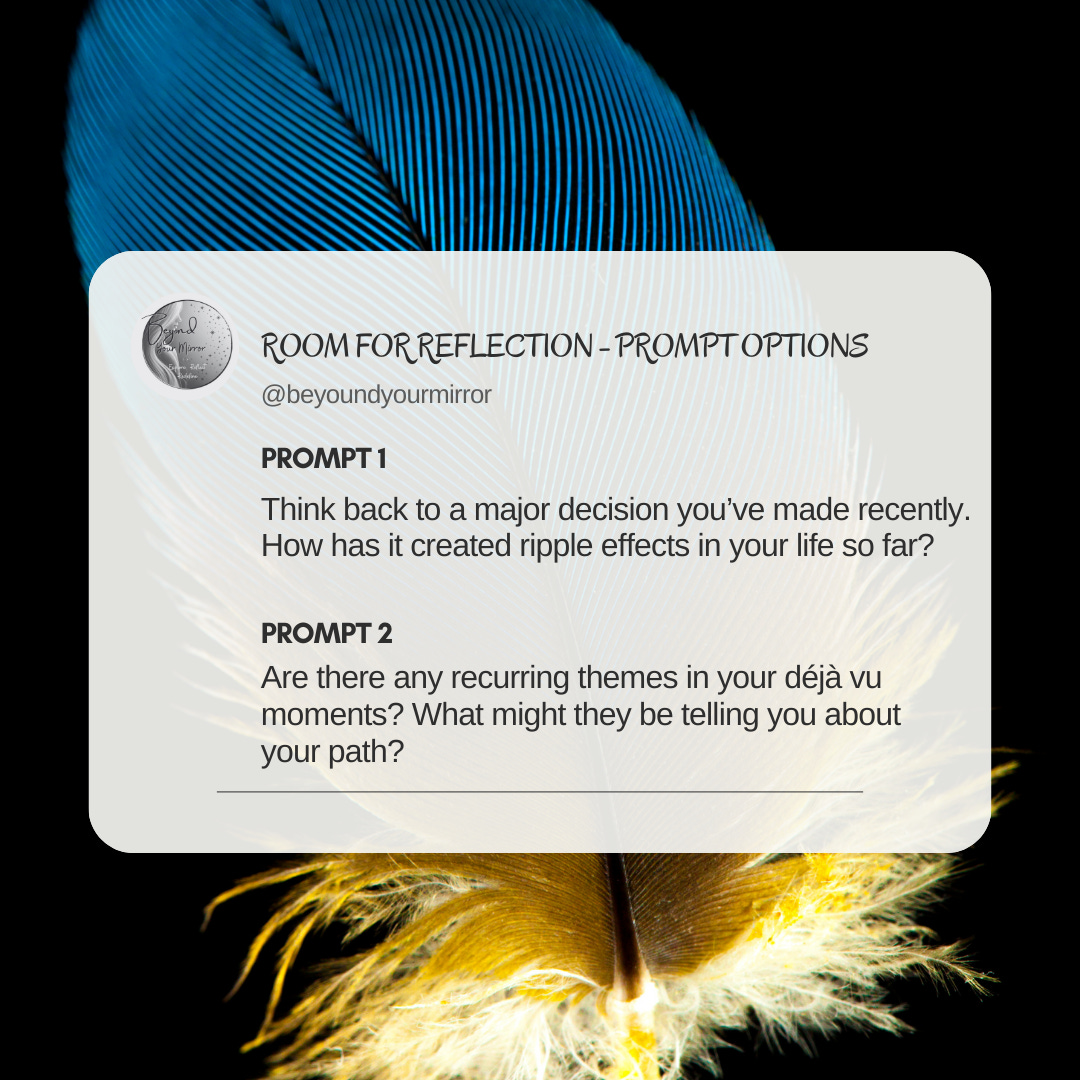Hello beautiful souls!
Welcome to our little corner of the written world where we learn a little, reflect a little, laugh a little, and embrace the multidimensional nature of our human experience - those things that lie within and around us, beyond the mirror.
This week, we’re talking about the mysteries and science behind déjà vu. Because whether it’s science, systems, or something mystical, déjà vu reminds us that life isn’t random—it’s a beautifully interconnected adventure, and you’re the one writing the next chapter.
Thank you for joining me on this journey - let’s explore together!
Warmly, Sharon
Don’t have time to read, press Play to listen to this article.
Have you ever had a moment where time folds in on itself? A fleeting sensation that you’ve lived that exact moment before? What the Matrix franchise might have called “a glitch in the matrix.” You can almost visualize what’s about to happen next, but then your brain, seemingly overwhelmed, just shuts it down. We call this strange, almost eerie familiarity, déjà vu.
For me, déjà vu always seems to show up during major life transitions. I start to experience it more often when there is a lot of change happening. I’ve always imagined déjà vu as the universe giving me a little wink, a playful nudge to say, “You’re on the right path.” It feels like a guidepost in a choose-your-own-adventure book, an affirmation of the decision I’ve made, among many possible paths, being the right one. Perhaps that’s just my own justification system, but it feels intuitively accurate to me.
Do you remember those choose-your-own-adventure books? The story progression changed based on the choice you made at a critical point in the story. I would select a path, sure of my choice, but then I always had to read the other alternate endings. If only we had that option in life! Clearly this is an idea that we humans just love - cue countless popular movies and books providing us a glimpse of “what-if” scenarios and the power of small decisions (Sliding Doors, The Butterfly Effect, Eternal Sunshine of the Spotless Mind, Back to 15, etc.).

Our choices (and our parents’) end up defining our lives - where we live, who we grow up with, what we do for a living, where we study, who we date, where we travel, and the list goes on. But, these are the obvious ones. There are also choices we make along the way that may seem small, but shift our trajectory in powerful ways.
Let’s Dig In: Humans as a System with Bifurcation Points
I fell in love with Systems Thinking in my Master’s program at Temple University in Philadelphia. I had a professor, Dr. Larry Kraft, who had such a passion for it that it was contagious, but it also deeply resonated with me. As a big picture thinker, a lover of science and believer of the mysteries of the universe, it spoke to the way my brain worked.
Systems thinking invites us to see our lives not as linear progressions, but as dynamic, interconnected systems. Each decision we make, big or small, feeds into the system, creating feedback loops, ripple effects, and new possibilities.
Within this approach to looking at systems, we covered bifurcation points. These points are critical moments where the system’s trajectory changes dramatically based on an input or decision. According to Google’s “AI” overview (based on a sweep of resources), it offers to define it as “...a critical point within a system where a small change or input can lead to a significant, qualitative shift in the system's behavior, often causing it to transition to a completely different state or dynamic; essentially, it's a tipping point where the system can drastically change its trajectory based on a subtle alteration in conditions.” And, yes, we are systems too, so this applies to us and to keep it simple our choices create entirely new possibilities. Meaning that at any point we can make choices to create new outcomes. That’s pretty powerful stuff.
These points aren’t always obvious at the moment. Sometimes they’re as significant as deciding to change careers, move to a new city, or end a relationship. Other times, they’re seemingly minor: a conversation with a stranger, a last-minute decision to say yes to an opportunity, or even choosing to take a different route home. But as systems thinking teaches us, the smallest shifts at a bifurcation point can create exponential changes over time.
How Does Déjà Vu Fit In?
I like to think of déjà vu as a wink from the universe that you’ve arrived at one of these points. It’s a moment when time feels elastic, stretched between past, present, and future. For a brief instant, you’re aware that the path you’re walking could shift in significant ways, even if you don’t know how or why.
From a scientific perspective, one explanation is that déjà vu may occur when the brain is processing information in a way that mimics memory; essentially, your present experience feels so familiar that your brain mistakes it for something you’ve already lived.
But what if it’s more than that? Stay with me here. What if déjà vu is also a reminder of the interconnectedness of life? An indicator that the decisions you’ve made at past bifurcation points have aligned you with the path you’re meant to walk?
When we experience déjà vu, it’s as if our internal system pauses for a moment, bringing us into heightened awareness of where we are. It’s a chance to reflect on the trajectory we’re on and ask ourselves:
Am I moving in the right direction?
What opportunities might this moment hold?
What feedback is the universe giving me about the choices I’ve made?
Let’s Talk about Déjà Vu
The term déjà vu translates from French to mean already seen.
An article on VeryWellMind tells us a bit about the origins of the word déjà vu. “St. Augustine, an ancient philosopher, first referred to the concept of déjà vu in 400 AD as “false memoriae,” but French philosopher Emile Boirac was the first to use the term déjà vu in 1890.
How does science explain déjà vu? According to neuroscientists, déjà vu may occur when there’s a glitch in how our brain processes memory (hmmm...“glitch in the matrix”).
Some researchers suggest it’s caused by the brain mistaking the present for a memory, as though your brain’s file cabinet briefly misfiles an experience.
Others think it may be related to how we predict patterns, our brains subconsciously processing what might happen next and misinterpreting it as something we’ve already seen.
Interestingly, some studies also link déjà vu to heightened activity in the temporal lobe, the part of the brain that deals with memory and sensory input. It’s as if your brain is working overtime to connect dots it can’t quite explain.
But no matter how much science may demystify it, I still can’t shake the sense that déjà vu is something more. Maybe it’s a cosmic nudge, a subtle reminder that life isn’t just a random string of events.
I’d love to hear your thoughts: When has déjà vu shown up for you? Did it feel like a cosmic wink, a brain glitch, or something in between?
Share your story or thoughts in the comments. Your insights could spark a whole new perspective for someone else.
Here are two prompts to consider for your own reflection which can remain private, be addressed in comments, or you can share your whole reflection in the Beyond Your Mirror chat.
Think back to a major decision you’ve made recently. How has it created ripple effects in your life so far?
Are there any recurring themes in your déjà vu moments? What might they be telling you about your path?
So, how can you use this science-meets-mystical perspective to show up more fully in your personal and professional life?
Pause at Your Bifurcation Points
When you feel déjà vu, or even when you sense a choice is significant, pause. Reflect on where you’ve been and where you want to go. Ask yourself:
What’s the bigger context of this moment?
What ripple effects could this decision create?
How does this align with my values and goals?
Trust Your Gut (and Your Brain)
Your brain’s ability to process patterns and predict outcomes is a superpower. That gut feeling you get during déjà vu? It’s worth listening to. Use it as a reminder to reconnect with your instincts, even in difficult situations.
Lean Into Curiosity
Instead of brushing off déjà vu as a fleeting weirdness, get curious. Why does this moment feel significant? What’s different or familiar about it? Use that curiosity to stay present and aware.
Create Feedback Loops in Your Work
In leadership, feedback loops help you see how decisions affect your team and goals. Treat bifurcation points like mini déjà vu moments: pause, reflect, and assess how your choices align with your long-term vision.
Let Wonder and Science Coexist
Just because there’s a scientific explanation doesn’t mean déjà vu loses its magic. Whether it’s a memory misfire or a cosmic wink, use it as a moment to ground yourself in the interconnectedness of your life.
Because whether it’s science, systems, or something mystical, déjà vu reminds us that life isn’t random, it’s a beautifully interconnected adventure, and you’re the one writing the next chapter.
Podcast: Speaking of Psychology: What déjà vu can teach us about memory, with Chris Moulin, PhD
Popular Science Article: How does science explain déjà vu? It’s a brain glitch with a purpose.
Podcast: How Déjà Vu Works (Stuff You Should Know)
Audio Book: Blink: The Power of Thinking Without Thinking by Malcolm Gladwell












